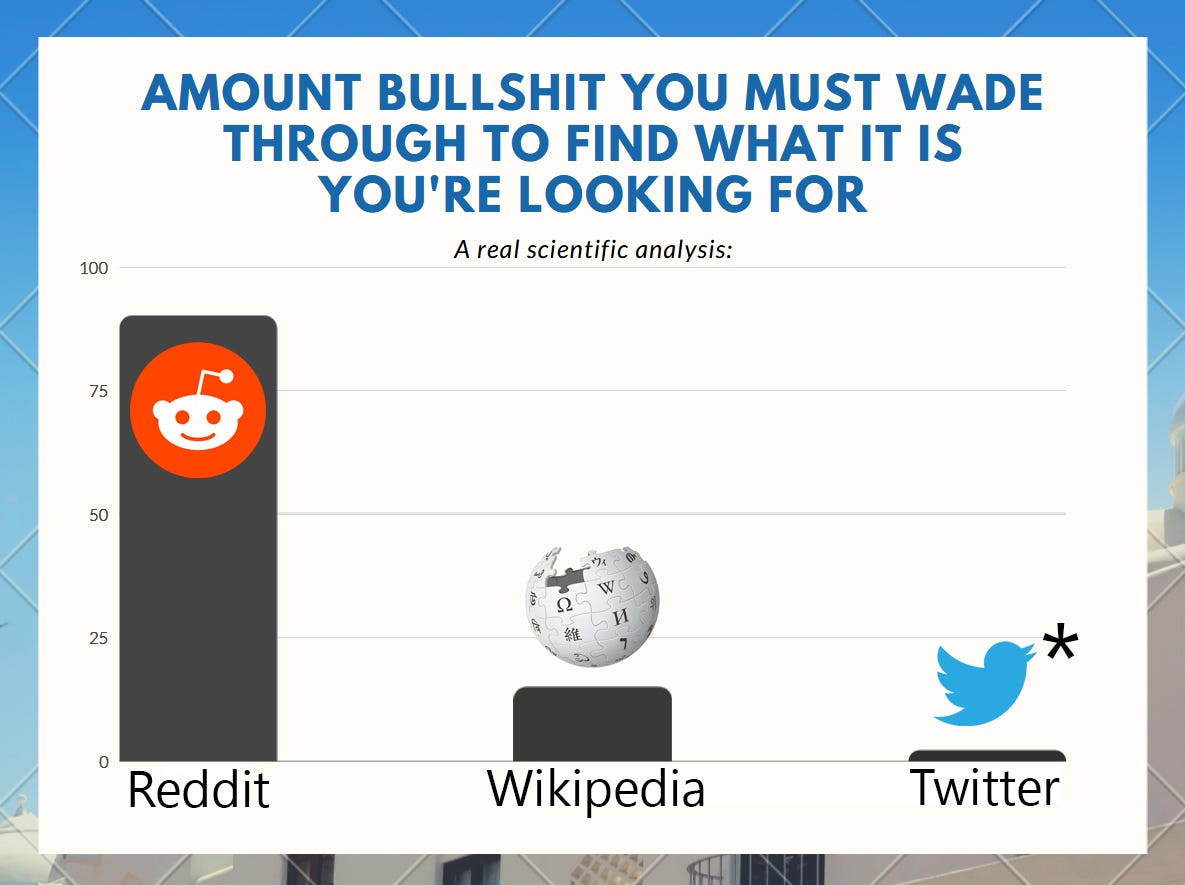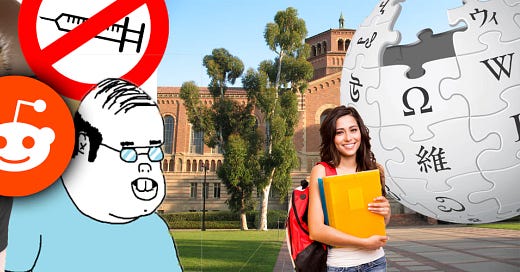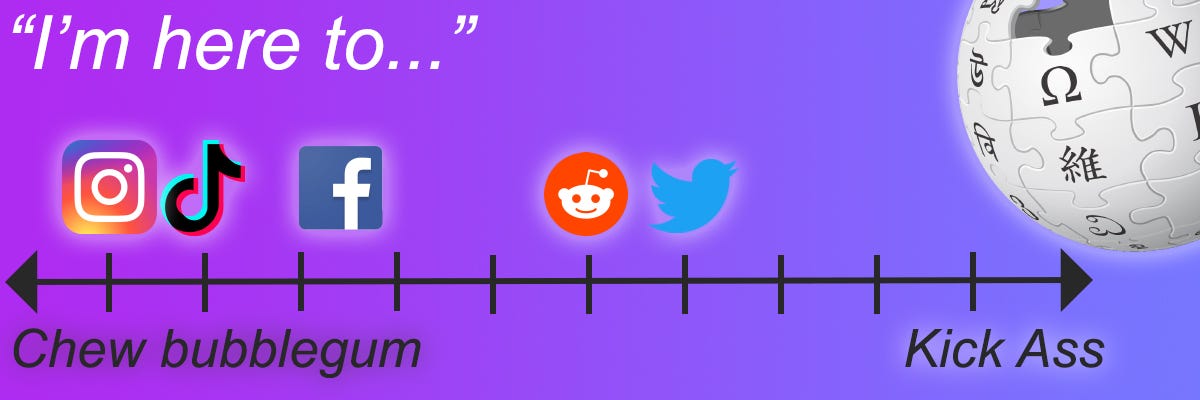Adults in the Room
The one simple trick that makes Wikipedia so much less awful than other social media
When asked to think of social media, Wikipedia is probably not the first (or second… or twelfth) thing that comes to mind. But consider that it actually shares many similarities with the big social media sites, particularly Reddit. Both Reddit and Wikipedia contributors have user profiles, both sites are solidly Web 2.0, and both are essentially subdivided by topic. But the central similarity between Wikipedia and the other social media sites is a reliance on user-generated content.
So why is it that the experience of browsing Reddit is just so much more… awful? I posit that the functional explanation is actually quite small, but of outsized importance.
What’s your poison?
Consider that there are two “main” types of social media. The first kind is built foremost around connecting people who already know each other in real life (or who want to know each other better in real life) i.e. the Facebooks, Instagram and TikToks of the world. The second kind are those who’s focus is built around connecting strangers over shared interest, like Reddit, YouTube, and (to a lesser extent) Twitter (which tends to skew more “news junkie” than “hobbyist” but I digress).
These categories are not absolute, the lines blur and overlap frequently. Many Facebook communities are built around shared interests, many Reddit subreddits are built around geographic proximity. The typical Twitter user follows a mix of people they know IRL and many they don’t.
Generally speaking though, the typical Reddit user isn’t logging in to post pictures of grandma (unless it’s to r/oldschoolcool), and the average Instagram user isn’t opening the app with the intention of reading TodayIFuckedUp stories (Although it’s difficult to imagine anyone opening Instagram with intention period).
I really don’t want to describe sites like Reddit and Twitter as being more “intellectual”, though it’s probably safe to say they do try to appeal more to the novelty-seeking/learning parts of our brains than to the entertainment/emotional side (which I would argue is moreso the domain of Instagram and TikTok). Reddit and Twitter attract the people who feel a need to “know everything and be on top of it”, especially in the political and tech spheres.
Wikipedia also appeals to the parts of us that desire to learn (it’s an encyclopedia after all). Every trivia or history junkie knows how easy it is to fall down a rabbit hole on Wikipedia; wherein you open the site looking to see if Abe Vigoda is still alive, and fifteen minutes later you’re neck deep in “Spanish conquest of the Americas” with twenty tabs open and a foamy substance beginning to form at the sides of your mouth.
Reddit on the other hand, houses a wealth of a different type of information: the practical kind. It is often the place you’ll find yourself after googling an extremely-specific question about a PC bug, sewing machine repair, or the ideal method to extract flavonoids from a dark roast using an aeropress.

Both Reddit and Wikipedia brand themselves as places to “learn something new”, Both have a lot of self-professed “experts” (and presumably some actual ones). But the misinformation, propaganda and petty tribalism that will often overrun Reddit to a point of uselessness, is simply not a problem to the same degree on Wikipedia. Why?
Anti-science, political propaganda, and “being wrong on the internet”.
On both platforms, the “experts”1 are wrong a lot of the time, sometimes in very serious and life-threatening ways. Both platforms have their dramas behind the scenes (and sometimes very openly). But the reason that the experience of browsing Reddit is *mostly* hot garbage and that of Wikipedia is *mostly* not, is that Wikipedia has structural mechanisms in place that can try to remedy the situation when someone (intentionally or not) presents incorrect information as fact. Wikipedia has moderators.
You may be thinking “wait- Reddit has moderators!” Love ‘em or hate ‘em, every subreddit has at least one moderator, usually the person who created the subreddit. It’s only Reddit’s limited moderators that keep the site-wide decorum a notch above “the chans”. Anyone can start a new subreddit and create whatever kind of community they want. But most “mods” are in their positions simply because they got there first, not any particular talent or qualification for running an online community.
Moderators essentially have absolute authority over what posts/comments are removed from their communities. Reddit employees will occasionally step in if they don’t like how a moderator chooses to run their subreddit, but for the most part the “admins” leave things up to the individual mods. Which brings us to my central point in this comparison:
Who moderates the moderators?
If a subreddit moderator wants to remove (for example) hate speech or COVID misinformation, Reddit inc probably won’t interfere. Similarly, if someone wants to create a subreddit for spreading hate speech or COVID misinformation to other communities within or outside of Reddit, that can happen too.2 And unlike on Wikipedia, where there is a class of users who are able to remove content deemed inaccurate, Reddit has nobody serving that function (or at least nobody who is choosing to serve that function) on a site-wide basis.
Don’t misunderstand; the problem with Reddit is not it’s lack of a definitive “truth czar” who determines how best to wire your home stereo system, or who to vote for in your local elections. Reddit is correct that healthy communities need room to be wrong, especially because Reddit’s practical information is much more specialized and personalized than the information that Wikipedia contributors make. But without Reddit inc enforcing a line (any line) in regards to science, reality and anti-science propaganda, truth and fiction get blurred. Often intentionally.
What Wikipedia’s existence proves is that it’s entirely possible to moderate a very large platform on a broad variety of topics without destroying freedom of speech.
So who does moderate the moderators? On Reddit the answer is essentially no one. Reddit could -Wikipedia proves that it’s entirely possible- But the people in charge are choosing not to. When all topics; including pseudoscience, “race science” and real science, are treated as equally valid realms of inquiry and debate, the result is that no shared reality exists, and without an adult in the room, even the most mundane and apolitical discussions can (and will) turn into an endless “both sides” flame war.
Reddit doesn’t have to be this way, it doesn’t have to serve poison at the buffet. Nobody is forcing them to do it and scant users are asking for it. But they are doing it, and all of us are worse for it.
“““““““experts””””””””
Technically Reddit’s content policy forbids “Communities and users that incite violence or that promote hate based on identity or vulnerability”, however in practice this policy is rarely enforced without sustained external pressure (usually from a media outlet). It also bypasses the fact that most of Reddit’s hate speech/misinformation takes place within the rules of subreddits that are ostensibly about a different topic, and the content is permitted by that subreddit’s mods (i.e., a subreddit about “ivermectin” that primarily produces COVID and vaccine denial content, or a subreddit about “ethics in gaming journalism” that well, you know).






